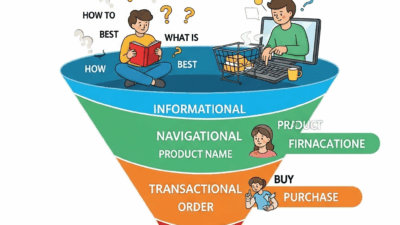In the digital age, businesses are constantly exploring innovative ways to promote their products and services. One such method that has gained significant popularity is affiliate marketing. In this comprehensive guide, we’ll dive deep into the realm of affiliate marketing, unraveling its essence, understanding its mechanics, and exploring how it can benefit both businesses and individuals.
Understanding Affiliate Marketing
What is Affiliate Marketing? Affiliate marketing is a performance-based marketing strategy where businesses or product creators reward individuals or entities (affiliates) for driving traffic or sales to their website through the affiliate’s marketing efforts. In simpler terms, it’s a partnership where affiliates earn a commission for each sale or action generated through their marketing efforts.
The Affiliate Marketing Ecosystem:
- Advertiser (Merchant)
The business or company that offers products or services and seeks to increase sales or generate leads through affiliate marketing. - Affiliate (Publisher or Partner)
Individuals, website owners, bloggers, or businesses that promote the advertiser’s products or services on their platforms. - Affiliate Network
In many cases, affiliate marketing is facilitated through affiliate networks, which act as intermediaries connecting advertisers and affiliates. These networks provide tracking, reporting, and payment services, making it easier for both parties to manage their affiliate relationships. - Affiliate Links
Affiliates use unique tracking links provided by the advertiser or affiliate network to promote products or services. These links allow the advertiser to attribute sales or leads generated by specific affiliates. - Commission Structure
Advertisers determine the commission structure for their affiliate program. Commissions can be based on a percentage of sales, a fixed amount per sale or lead, or a hybrid model. - Cookies and Tracking
Cookies or other tracking mechanisms are used to record when a user clicks an affiliate link and makes a purchase or performs the desired action on the advertiser’s website. This tracking ensures affiliates are credited for their referrals. - Promotional Strategies
Affiliates use various promotional strategies to drive traffic and conversions, including content marketing, email marketing, social media marketing, paid advertising, and more.
How Affiliate Marketing Works
Now, let’s break down the mechanics of how affiliate marketing operates:
- Affiliate Sign-Up
Affiliates typically begin by signing up for an affiliate program offered by a merchant. These programs are often free to join. - Promoting Products or Services
Once accepted into the program, affiliates gain access to unique tracking links or banners provided by the merchant. They use these assets to promote the merchant’s products or services through various marketing channels. - Tracking and Analytics
Each tracking link assigned to an affiliate contains a unique code that identifies the affiliate responsible for driving traffic or sales. This code allows for precise tracking of the affiliate’s performance. - Generating Sales or Actions
Affiliates leverage their marketing skills and strategies to drive traffic to the merchant’s website. When a consumer clicks on their affiliate link and makes a purchase or performs a specific action, such as filling out a form, the affiliate is credited for that conversion. - Earning Commissions
Affiliates earn commissions based on the agreed-upon terms of the affiliate program. Commissions can be a percentage of the sale amount or a fixed fee, depending on the program. - Payment
After accumulating a certain amount of earnings, affiliates receive payments from the merchant or affiliate network. Payment schedules and methods vary by program.

Why is Affiliate Marketing Profitable?
Affiliate marketing can be highly profitable for several reasons:
- Performance-Based Model
In affiliate marketing, advertisers only pay commissions to affiliates when specific actions are taken, such as a sale, lead generation, or website traffic. This performance-based model ensures that advertisers see a return on investment (ROI) since they only pay when desired results are achieved. - Cost-Effective
Advertisers don’t incur upfront advertising costs with affiliate marketing. Instead, they invest in marketing efforts that produce measurable results. This reduces the risk of advertising spend without guaranteed outcomes. - Access to a Diverse Audience
Affiliate marketers often have well-established audiences, niches, or communities. Partnering with affiliates allows advertisers to access these pre-qualified and engaged audiences that may be difficult or costly to reach through other marketing channels. - Scalability
Affiliate marketing can be scaled up or down according to the advertiser’s needs and budget. Advertisers can choose to work with a few affiliates or create a large network of partners. - Wide Reach
Affiliates can promote products or services to audiences across different regions and demographics, expanding the brand’s reach and potential customer base. - Third-Party Endorsement
Affiliate marketing leverages the trust and credibility that affiliates have built with their audiences. When an affiliate promotes a product or service, it often carries more weight than traditional advertising because it’s seen as a recommendation from a trusted source. - Diverse Promotion Methods
Affiliates use various promotion methods such as content marketing, social media marketing, email marketing, paid advertising, and more. This diversity of tactics can help reach different segments of the target audience effectively. - Measurable Results
Affiliate marketing provides clear and measurable performance metrics. Advertisers can track sales, leads, clicks, and other key performance indicators (KPIs) to evaluate the effectiveness of their campaigns. - Low Overhead Costs
Unlike other forms of advertising, affiliate marketing typically doesn’t require advertisers to maintain physical inventory, handle customer service, or manage fulfillment, reducing operational costs. - Flexibility
Advertisers have the flexibility to define their affiliate program’s terms, commission rates, and campaign objectives, allowing them to align the program with their specific goals. - Enhanced Brand Visibility
Affiliate marketing campaigns can increase brand visibility and awareness as affiliates actively promote the brand to their audiences. - Global Reach
Affiliate marketing isn’t limited by geographical boundaries. Advertisers can partner with affiliates from around the world, making it possible to reach an international audience.
While affiliate marketing offers the potential for profitability, it’s essential for both advertisers and affiliates to approach it with careful planning and ethical practices. Advertisers should choose affiliates that align with their brand values and closely monitor their program’s performance. Affiliates should prioritize transparency and authenticity to maintain their credibility with their audiences. When executed effectively and ethically, affiliate marketing can be a mutually beneficial and profitable partnership for all parties involved.
How To Start Affiliate Marketing?
Starting affiliate marketing involves several steps. Here’s a step-by-step guide to help you get started with affiliate marketing:
- Choose Your Niche
Select a niche or industry that you are passionate about or have knowledge in. Your chosen niche should also have a market for relevant products or services. - Research Affiliate Programs
Look for affiliate programs that align with your chosen niche. Research different affiliate networks (like Amazon Associates, ShareASale, or CJ Affiliate) and individual companies with affiliate programs. - Join Affiliate Programs
Sign up for the affiliate programs you’ve identified. Typically, you’ll need to provide basic information about your website, traffic sources, and promotional methods. - Build a Website or Platform
Create a website or blog where you can promote affiliate products or services. If you already have a platform (e.g., a blog or social media following), you can use that. - Produce Quality Content
Start creating valuable and relevant content in your chosen niche. Content can include blog posts, reviews, how-to guides, videos, or any form of content that informs, entertains, or helps your audience. - Select Affiliate Products
Choose affiliate products or services that fit naturally within your content. Your recommendations should provide value to your audience and be closely related to your niche. - Integrate Affiliate Links
Incorporate affiliate links within your content where appropriate. Ensure that these links are properly disclosed as affiliate links to maintain transparency with your audience. - Promote Your Content
Share your content through various channels, including social media, email marketing, SEO, and other promotional methods relevant to your niche. - Track Performance
Use tracking tools provided by affiliate programs to monitor the performance of your affiliate links and campaigns. Track clicks, conversions, and earnings to assess your success. - Optimize and Scale
Continuously analyze your affiliate marketing efforts and identify what’s working and what needs improvement. Optimize your strategies based on data and scale your efforts as you gain experience. - Comply with Legal and Ethical Guidelines
Familiarize yourself with affiliate marketing regulations and disclosure requirements in your region. Ensure you comply with these guidelines to maintain trust with your audience. - Build Relationships
Establish good relationships with affiliate managers and fellow affiliates. Networking within the affiliate marketing community can provide valuable insights and opportunities. - Diversify Income Streams
Consider diversifying your income sources by promoting products from different affiliate programs or networks. This can help reduce dependence on a single source. - Be Patient and Persistent
Affiliate marketing takes time to generate significant income. Be patient, stay consistent, and keep refining your strategies. - Learn and Improve
Keep learning about affiliate marketing, digital marketing trends, and your niche. Attend webinars, read industry blogs, and seek opportunities to improve your skills.
Remember that affiliate marketing success doesn’t happen overnight. It requires dedication, persistence, and a commitment to providing value to your audience. As you gain experience and build trust with your audience, you can potentially turn affiliate marketing into a profitable income stream.

The Benefits of Affiliate Marketing
For Businesses
Affiliate marketing offers numerous advantages for businesses looking to expand their reach and increase sales:
- Cost-Effective Marketing
Businesses only pay affiliates when they successfully generate sales or actions, making it a cost-effective advertising strategy. - Broadened Audience Reach
Affiliates often have their own established audiences, allowing businesses to tap into new markets they might not reach through traditional marketing. - Performance-Based Model
Affiliate marketing operates on a performance-based model, aligning the interests of both the business and the affiliate. If affiliates don’t drive results, they don’t earn commissions. - Enhanced SEO
Affiliate marketing can contribute to improved search engine optimization (SEO) as affiliates create content and generate backlinks to the business’s website.\
For Affiliates
Affiliate marketing also presents compelling benefits for individuals and entities that choose to become affiliates:
- Revenue Generation
Affiliates have the potential to earn a passive income by promoting products or services they believe in. - Low Barrier to Entry
Joining an affiliate program is typically straightforward and doesn’t require significant upfront investment. - Diverse Income Streams
Affiliates can promote products or services from various merchants, diversifying their income streams. - Flexibility
Affiliate marketing allows individuals to work at their own pace and choose their preferred marketing channels.
Exploring Affiliate Marketing Strategies
To excel in affiliate marketing, both businesses and affiliates can implement various strategies to maximize their success.
Content Marketing
- Valuable Content Creation
Affiliates can create informative blog posts, reviews, videos, or other forms of content to showcase the merchant’s products or services in a helpful and engaging way. - SEO Optimization
Optimizing content for search engines can help affiliates attract organic traffic and potential customers.
Email Marketing
- Building Subscriber Lists
Affiliates can collect email addresses from interested individuals and send targeted offers and promotions. - Personalization
Personalized email marketing campaigns tend to have higher conversion rates. Affiliates can tailor their messages to individual subscriber preferences.
Social Media Promotion
- Leveraging Social Platforms
Affiliates can use social media to share affiliate links, engage with followers, and build trust with their audience. - Visual Content
Visual content, such as images and videos, can be highly effective on social media platforms for showcasing products or services.
Pay-Per-Click Advertising
- Targeted Ads
Affiliates can run PPC advertising campaigns to drive traffic directly to the merchant’s website. - Keyword Research
Keyword research is crucial for optimizing PPC ad campaigns and ensuring they reach the right audience.
Best Affiliate Marketing Networks
There are numerous affiliate marketing networks available, each with its strengths, features, and niches. The best affiliate marketing network for you depends on your specific needs, industry, and target audience. Here are some of the top affiliate marketing networks that you may consider:
- Amazon Associates
Amazon’s affiliate program is one of the most well-known and widely used networks. It offers a vast array of products, making it suitable for a variety of niches. Commissions vary depending on the product category. - ShareASale
ShareASale is a popular affiliate network with a broad range of merchants and affiliate programs. It’s known for its user-friendly interface, real-time reporting, and reliable tracking. - CJ Affiliate (formerly Commission Junction)
CJ Affiliate is one of the largest and oldest affiliate networks. It has a diverse range of advertisers, making it suitable for affiliates in various industries. - ClickBank
ClickBank specializes in digital products, such as ebooks, software, and online courses. It’s an excellent choice for affiliates interested in promoting digital goods. - Rakuten Advertising (formerly Rakuten Marketing)
Rakuten is a global affiliate network with a strong presence in the Asia-Pacific region. It features a variety of brands and offers competitive commissions. - FlexOffers
FlexOffers is known for its vast network of advertisers and affiliates. It provides a comprehensive range of tools and resources to help affiliates succeed. - Awin
Awin is a global affiliate marketing network that connects affiliates with a wide range of brands. It offers robust reporting and tracking capabilities. - MaxBounty
MaxBounty specializes in CPA (Cost Per Action) offers, where affiliates earn commissions for specific actions like lead generation, sign-ups, or sales. It’s suitable for performance-based affiliate marketing. - PeerFly
PeerFly is another CPA network known for its user-friendly interface and a wide range of offers. It offers competitive payouts and excellent support. - Impact Radius
Impact Radius is an enterprise-level affiliate marketing platform used by larger brands and advertisers. It provides advanced tracking and reporting capabilities. - PartnerStack
PartnerStack is designed for SaaS companies and B2B affiliate programs. It offers a platform for managing and growing partner relationships. - Tradedoubler
Tradedoubler is a European affiliate marketing network with a strong presence in the European market. It offers a variety of programs across different industries. - Pepperjam
Pepperjam is an affiliate marketing platform that emphasizes transparency and data-driven insights. It’s suitable for advertisers looking for advanced tracking and reporting. - Avangate (2Checkout)
Avangate, now part of 2Checkout, specializes in digital commerce and software products. It’s an ideal choice for affiliates in the software and digital goods space.
Before choosing an affiliate marketing network, consider factors like the types of products or services you want to promote, the commission structure, payment methods, reporting capabilities, and the network’s reputation. Additionally, it’s essential to read the terms and conditions of each network to ensure they align with your affiliate marketing goals and ethical practices.
Conclusion
In the vast landscape of digital marketing, affiliate marketing stands out as a mutually beneficial partnership between businesses and affiliates. It empowers individuals and entities to monetize their marketing skills while enabling businesses to expand their reach and boost sales. As the digital world continues to evolve, affiliate marketing will undoubtedly remain a dynamic and adaptable strategy, offering new opportunities and innovations for both affiliates and businesses alike. Whether you’re a business seeking to leverage affiliate marketing or an individual considering becoming an affiliate, understanding the fundamentals and staying informed about industry trends will be your key to success in this exciting field.











